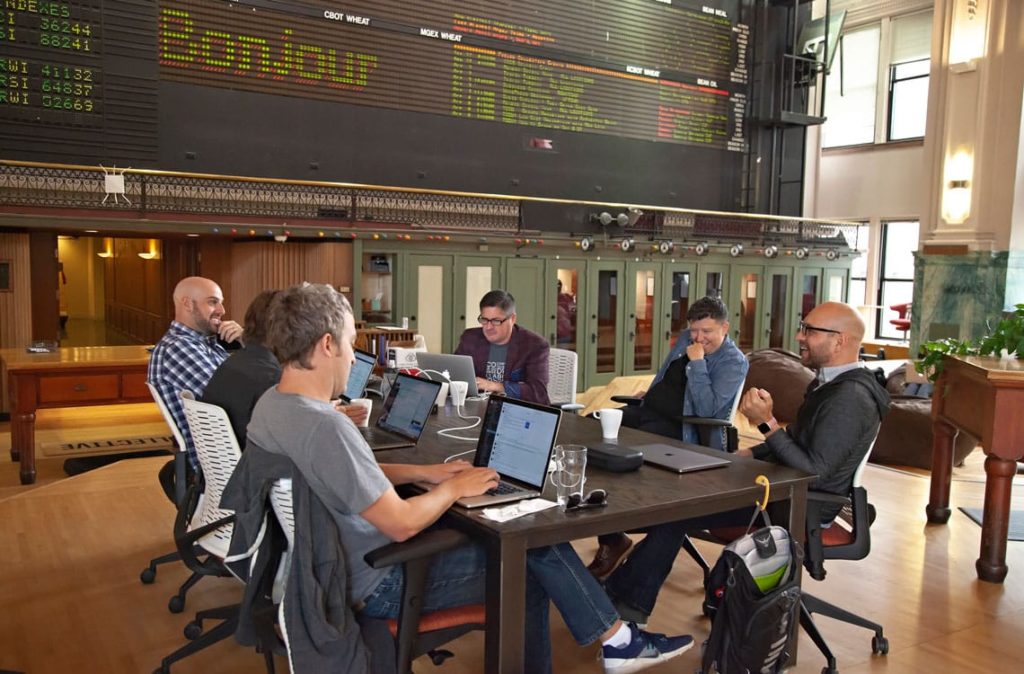Believe it or not, there are still plenty of people who aren’t familiar with coworking. We recently had some business community leaders ask us to help them understand what coworking is and why they should care. In other words, our elevator pitch. Below is what we sent over. (Ok, perhaps it’s really more of an “escalator pitch.”)
It’s no surprise that thanks to mobile technology (laptops, cell phones), there are more people than ever who are able to—and do—work outside of a traditional office. Many are self-employed. Increasingly, many are remote employees. The default workplaces for these people? Home offices and coffee shops. Which is great. Unless you’re even slightly extroverted and need more company than your cat. Or you can’t be productive when there are piles of dirty dishes and laundry. Or if you’re building a new business and what you need more than anything else is a steady flow of ideas, advice, talent and resources. Coworking is an answer to the growing need for people to work as part of a community, rather than working in isolation. And it’s growing fast. The first coworking space started in 2005. There are now close to 4,000 worldwide. Even major companies like AT&T and Accenture have embraced coworking as an essential part of their workspace portfolio. Now, isn’t coworking just a new flavor of office suites? Sure, in a loose sense. But the reason people choose office suites, —having a receptionist, an office with a closed door, a phone system and creating the impression of “being professional”—are not imperatives for the new generation of DIY business creators. Being connected and having access to resources when you need them trumps everything else. This is the generation that has embraced car sharing, taxi sharing, bike sharing and house sharing, after all. So, who shows up at coworking spaces? It’s a Who’s Who of the Creative Class. You have entrepreneurs, consultants, freelancers and small business owners. Software devleopers, designers, IT workers and strategists. And increasingly, venture capitalists, attorneys and CPAs. In a word: knowledge workers. Because when you’re working in the knowledge economy, your stock in trade is information and ideas. Coworking spaces are essentially idea and information exchanges that cater to this need. But, more importantly, why are coworkers willing to pay for the privilege when there’s free office space at home or cheap rent down the street? It all comes back to community. In today’s economy, where new businesses are launched and grow at lightning speeds, the cost of working in isolation is huge. We’re all familiar with accelerators and incubators, which strive to push new companies to succeed quickly. Well, coworking is a de-facto accelerator program, in which many types of companies—not just tech startups—are able to leverage a community of knowledge workers in order to get off the ground and succeed. All for a relatively cheap monthly membership fee. Which brings us to the notion of cheap rent. In some communities there are still cheap rents to be had. Even so, there are built-in liabilities of becoming a tenant. One, leases tend to require a long term commitment, usually 3 to 5 years. If your startup or small business is based in the knowledge economy, chances are you’re solving for problems that didn’t even exist 3 years ago. You’d be crazy to sign a personal guarantee on a 3-year lease, when your entire business model could be outdated within that timespan. Adding to the burden of a traditional lease is the need to figure out and pay for internet connectivity, a computer network, a phone system, furniture and insurance. For a business trying to grow, all this is a distraction at best, and at worst business-killing overhead. Finally, there’s a phenomenon that, frankly, has surprised us, which is that Coco members tend to do a lot of business with each other. In other words, if you’re a solopreneur looking for clients or a startup looking for beta users, you just might find them at a coworking space. We’re reluctant to guarantee this kind of outcome for everyone, but in fact we have a number of members who get more than half of their business directly, or via referral, from other Coco members. All of which underscores the principle at the heart of coworking: people do business with people they like and trust.
One observation… We’ve been making the case for coworking ever since Day One (example: “How coworking is changing how and where we work“). It’s interesting to see how, with over 5 years of experience under our belt, the argument has evolved from being more idealistic (“cowork and all your dreams will come true”) to more pragmatic (“cowork and you will begin to see some tangible progress in your business”). Photo Credit: Georgie Pauwels via Compfight cc

